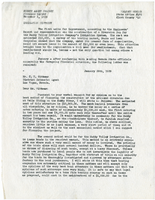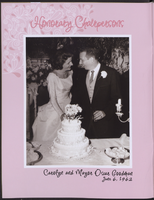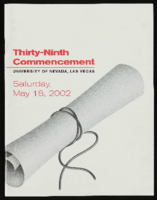Search the Special Collections and Archives Portal
Search Results

Transcript of interview with Alfred "Al" Isola by Stephen Kalish, March 15, 1976
Date
Archival Collection
Description
On March 15, 1976, Stephen Kalish interviewed Alfred “Al” Isola (born August 3rd, 1917 in Oakland, California) in his office about his garbage company and early Southern Nevada. The two discuss Las Vegas’ lack of a unified garbage system and how dumping sites have had to adjust their practices in order to limit their impact on pollution. Isola also explains the different disposal protocols for wet and dry trash. On the second tape of the interview, an unidentified woman enters the conversation.
Text

County agent project progress report, Irrigation district, November 1, 1929
Date
Archival Collection
Description
Progress report with copies of relevant correspondence regarding the creation of an irrigation district in the Moapa Valley. Project Number: State Office #172, Clark County #12
Text

Program for The Wedding event at Temple Beth Sholom, June 6, 2010
Date
Archival Collection
Description
Booklet for the Wedding celebrations and vow renewals of couples at Temple Beth Sholom.
Text

University of Nevada, Las Vegas (UNLV) 39th commencement program
Date
Archival Collection
Description
Commencement program from University of Nevada, Las Vegas Commencement Programs and Graduation Lists (UA-00115).
Text

Transcript of interview with Fran Fine-Ventura by Barbara Tabach, March 4, 2015
Date
Archival Collection
Description
In this interview, Fine discusses her childhood as well as the path that led to her career in law, which included working on a presidential campaign in New York City as well as several legal secretary positions in Washington, D.C., Texas and California, before eventually receiving her law degree from Golden Gate University. In addition, she reflects upon working on the infamous Jeff MacDonald murder trial in the 1970s as well as her experience becoming?and ending her service as?a Family Court Judge. Fine also discusses her community service work, particularly with the Women?s Philanthropy Board of the Jewish Federation and with Temple Beth Am.
Frances-Ann "Fran" Fine-Ventura is an attorney at the Fine and Price Law Group in Las Vegas, Nevada. She was born September 28, 1951, in Cleveland, Ohio, and moved to Arizona at the age of eleven when her father sought new economic opportunities out West. Fine eventually moved to Las Vegas shortly after she graduated law school in 1983. Fine worked for the U.S. Attorney's Office in Nevada in the early 1980s, then at several private law firms. From 1992 to 1998, she served as a District Court Judge in the Family Division of the Eighth Judicial District Court. Fine is involved in the Las Vegas community via the Nevada School of the Arts and the Court Appointed Special Advocate (CASA) Foundation in Clark County, Nevada. She has also been involved with the Women's Philanthropy Board of the Jewish Federation of Las Vegas since 1984, and served as chair from 2014 to 2016. Fran Fine's brother is Las Vegas real estate developer Mark Fine. In this interview, Fine discusses her childhood as well as the path that led to her career in law, which included working on a presidential campaign in New York City as well as several legal secretary positions in Washington, D.C., Texas and California, before eventually receiving her law degree from Golden Gate University. In addition, she reflects upon working on the infamous Jeff MacDonald murder trial in the 1970s as well as her experience becoming?and ending her service as?a Family Court Judge. Fine also discusses her community service work, particularly with the Women?s Philanthropy Board of the Jewish Federation and with Temple Beth Am.
Text

Transcript of interview with Dorothy George by Claytee White, October 13, 2003
Date
Archival Collection
Description
After serving as a nurse in World War II in Hawaii, Okinawa and Japan, Dorothy returned home to Chippewa Falls, Wisconsin. She experienced a particularly bad winter and she set out for California but stopped in Las Vegas to visit the family of her traveling companion, a girlfriend from her home town. The girlfriend returned to Wisconsin and George applied for a nursing license and got it within three days. She never left. Dorothy met her husband while working the night shift at Clark County Hospital. He would come in regularly to assist his patients in the births of their babies. Their occupations and their service in World War II drew them together in a marriage that has lasted over fifty years. From 1949 to this interview in 2003, Dorothy George has seen Las Vegas grow from a town that she loved to a metropolitan area that is no longer as friendly. She reminisces about the Heldorado parades, family picnics at Mount Charleston, watching the cloud formed by the atomic bomb tests, raising six successful children, leading a Girl Scout Troop, and working in organizations to improve the social and civic life of Las Vegas.
Text

Transcript of interview with Jim Olson by Stefani Evans and Claytee D. White, February 2, 2017
Date
Archival Collection
Description
As Las Vegas native Jim Olson looks back on his law career, he keeps returning to the case that gouged a sooty scar on his memory, altered legal practice and technology in Southern Nevada, captured the world's imagination, and changed international building codes-the MGM Grand Hotel and Casino fire of November 21, 1980, that killed 85 people and took eight years to litigate. Olson became involved with the litigation because his firm, Cromer, Barker, and Michaelson, represented the MGM Grand's insurance company, INA, Insurance Company of North America. Juggling thousands of claims, Olson ended up working with the MGM's corporate counsel in Los Angeles, a legal firm in Denver, Lloyd's of London, and a special master; renting additional office space for taking depositions; hiring graveyard-shift transcribers, and purchasing the legal world's latest technological marvel-a fax machine. As a first grader, five-year-old Jim was known to walk home during the school day whenever the St. Joseph nuns scared him. As an attorney whose career path was inspired by Perry Mason and augmented by his argumentative streak, Jim offers insights into litigation about some of Southern Nevada's most iconic buildings, signs, and spaces. In this interview, he recalls his mentors, Al Gunderson, George Cromer, Bill Barker, and Kent Michaelson. He talks of construction defect cases including his first MGM Grand litigation, in which his firm represented the architect, Martin Stern, when faulty siding fell off the building, and the 1994 lawsuits that followed when the top of the newly constructed, 365-foot Las Vegas Hilton sign blew down in a windstorm. He shares tales of legendary fellow attorney Mike Hines and his annual Nevada Bar Association parties on the Mike Hines Ranch, and he speaks to litigation between Hank Greenspun, Howard Hughes, and Hughes Tool Company.
Text

Transcript of interview with Blaine Benedict by Barbara Tabach, November 12, 2015
Date
Archival Collection
Description
Throughout this interview, Blaine shares stories of his father, Alvin Benedict. Al owned and operated Benedict and Remy Plumbing Business for a few years before entering into casino management. He is considered to be the first college educated executive and had an illustrious executive career at the MGM. He also was a co-founder with Susan and Irwin Molasky of Nathan Adelson Hospice.
Text

Interview with Jacob "Chic" Hecht, May 11, 2004
Date
Archival Collection
Description
Text

Interview with Ernest Benjamin Williams, October 27, 2004
Date
Archival Collection
Description
Text
